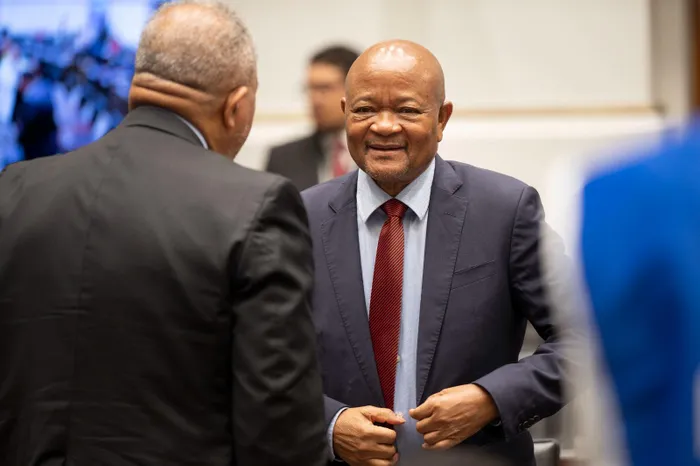
Police Minister Senzo Mchunu chats to evidence leader Advocate Norman Arendse during the first day of his testimony at the parliamentary inquiry into allegations of corruption in the criminal justice system.
Image: Amanda Hough/ Independent Newspapers
WHILE suspended Police Minister Senzo Mchunu faced the grilling of MPs over his alleged interference at SAPS, his ‘comrade’ and controversial North West businessman Brown Mogotsi’s property was being raided by police.
“The SAPS confirms that there is police presence at the business premises of Mr Brown Mogotsi in Seweding village in Mahikeng. This visit is part of an ongoing investigation that has already been discussed before the ad hoc committee and the Madlanga commission,” said police spokesperson Athlenda Mathe.
The ad hoc committee on Thursday heard Mchunu’s version of events following KwaZulu-Natal police commissioner Nhlanhla Mkhwanazi’s damning allegations that he interfered in SAPS operational matters to benefit criminal cartels.
At the centre of the allegations are Mkhwanazi’s claim that Mchunu disbanded the Political Killings Task Team (PKTT) in December 2024 for political reasons, and that he did not consult the police top brass.
Mchunu defended this decision, saying: “From 6 July I am wearing General Mkhwanazi. From 6 July I am smelling General Mkhwanazi and this is the first opportunity to explain myself and I am going to do justice to that.”
“I am pleading with you to give me the opportunity to do that, considering as well that he (Mkhwanazi) has gone to the Commissions for quite a long time piling accusations on me... so I am responding,” said Mchunu.
The Parliamentary inquiry was established to probe the unlawful dissolution of the PKTT, the freezing of filling vacancies within Crime Intelligence, alleged corruption by senior leaders in SAPS, and public and political interference in the work of the police.
Mchunu said he wrote the directive to disband the PKTT after he had looked at its performance, which did not meet his standards- a claim that was contradicted by Mkhwanazi and Masemola when they gave testimony.
“I thought we would have done more on all the difficulties we were coming across to make SAPS work better.”
Mchunu insisted that he wrote the directive to disband the PKTT in response to Mkhwanazi's claim that the document had been authored by someone else.
"The truth is that I sat down in that room alone and wrote what ended up being a directive,” he said, adding that he had shared the letter with ministerial advisor Advocate Vusi Pikoli and chief of staff Cedrick Nkabinde.
“I take personal responsibility for that letter and stand by it,” said Mchunu, adding that his devices can be searched to establish the origin of the document.
“I will hand it over. You will never find it having originated anywhere and I was sitting alone.”
Mchunu insisted that he did not exceed his powers, and neither did he flout the Constitution or the Police Act.
In an apparent response to Mkhwanazi's testimony that Mchunu was the subject of an investigation, Mchunu said he knew he was being probed by the police.
“I have nothing to do with criminal syndicates.”
Mogotsi has been implicated in the alleged unlawful interference at the SAPS. He has also been a central figure during the Madlanga Commission’s early testimony, with multiple witnesses pointing to his proximity to high ranking SAPS officials, being an information peddler and his alleged role in corrupting the integrity of law enforcement.
When first asked about Mogotsi in Parliament earlier this year, Mchunu said he did not know him, only to confirm him as a ‘comerade’ after pictures of them started circulating on social media.
Mkhwanazi had also accused Mchunu of having ties to controversial businessman Vusimuzi 'Cat' Matlala and claimed he was "financially supporting" Mchunu's political career.
Matlala had a lucrative contract with the police before it was abruptly cancelled when he was arrested for attempted murder in May.
Earlier, Mchunu said the PKTT was never part of the police organogram and that it enjoyed the status of a task team established for a particular purpose.
“There has always been a clear distinction between a task team and a unit. Units become part of an organogram,” he said, adding that the task team was meant to be evaluated frequently and was not envisaged to exist for a long term.
Cape Times
Related Topics: